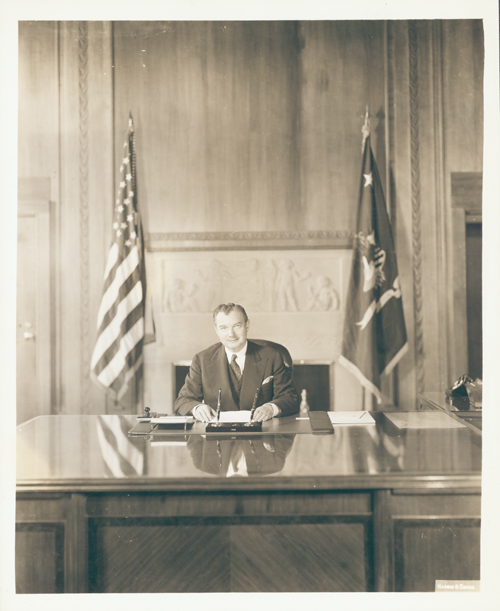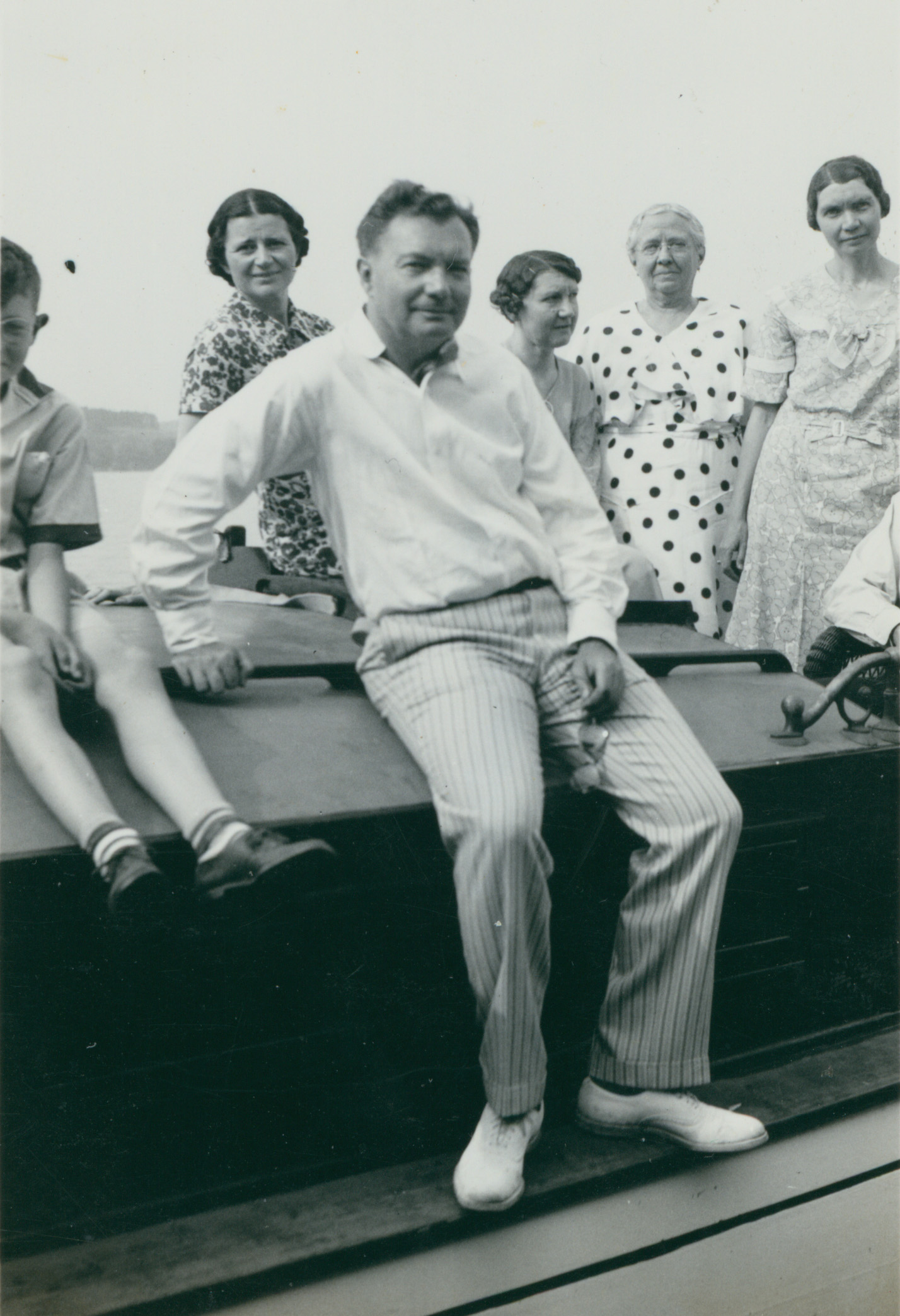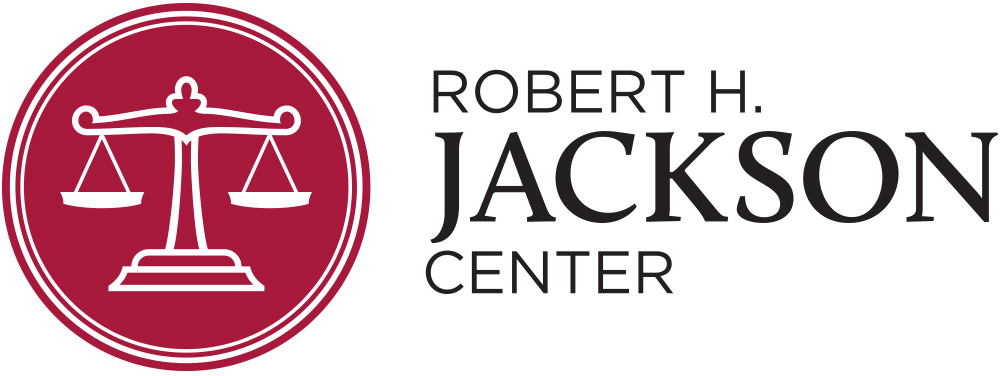
Justice at Home
"In New York State we used to say that a stormy election day was an indication that the Democrats would win because most Republicans lived upstate and had to travel a long way to get to the polls, and if it was a stormy day many of them stayed at home. It is not a very satisfactory thing that the policies of a state might depend on the accident of a snow storm on election day. But these are some of the things that have to be reckoned with in making public opinion bear effectively on government."
-Robert H. Jackson, Statecraft Under a Written Constitution
|
|
Welcome to Justice at Home, a special edition newsletter from the Robert H. Jackson Center that will hit your inbox every 3 weeks with updates on our virtual programming, lesson plans and lectures, and interesting finds from our digital archives.
If you enjoy this newsletter, please pass it on to a friend and share it on your social media pages. Make sure to tag us (@roberthjacksoncenter) and use the hashtag #JusticeatHome.
|
|

Every Thursday at 3pm live on our Facebook page, Tea Time with the Jackson Center takes both a look back at Jackson's place in history and a look forward showing how his legacy influences current events. You do not have to have a Facebook account to join us - simply click here to see our Facebook page, watch previous #TeawithRHJC events, and join us live on Thursdays at 3pm. The recorded videos are also uploaded onto the Jackson Center's website & YouTube channel.
This week, Greg Nevins, Senior Counsel & Director of Lambda Legal's Employment Fairness Project, and Kristan will discuss the recent Supreme Court decision confirming workplace anti-discrimination protections for LGBTQ+ employees and the Equality Act.
Recent guests have included:
-Margo Schlanger, the Wade H. and Dores M. McCree Collegiate Professor of Law at The University of Michigan discussing prisoners' rights.
-John Q. Barrett, Professor at St. John's School of Law, discussing Jackson's report on Nuremberg Trial procedures to President Truman.
If you have a Facebook account, follow our page and share the videos with your family and friends on social media using the hashtag #TeawithRHJC.
|
|
Revisiting LGBTQ+ Rights
On June 13, 2015, the Robert H. Jackson Center hosted a program on Bourke v. Beshear, a federal court challenge to Kentucky's laws that prohibited the state from recognizing valid out-of-state marriages and excluded same-sex couples from the benefits of marriage available to opposite-sex couples. A quick summary of the legal path - The district court judge sided with the Bourke plaintiffs and ruled Kentucky’s marriage laws violated the Equal Protection Clause of the Fourteenth Amendment. Kentucky’s Governor Beshear appealed the decision to the Sixth Circuit, which reversed that ruling in November 2014. In January 2015, the U.S. Supreme Court consolidated Bourke with three other cases and heard the cases under Obergefell v. Hodges.
Greg Peterson, co-founder of the Robert H. Jackson Center, interviewed Paul Campion & Randell Johnson, two of the petitioners in Bourke two weeks before the Supreme Court handed down its favorable decision in June 2015.
Click the video above to view a clip of the program. You can view the entirety of the interview here.
|
|

From Jackson's Desk
Robert H. Jackson was a gifted orator and writer, and many of his articles and transcripts of his speeches are housed on our website. We feature them in our weekly #TuesdayMotivation and #SundayQuote on the Jackson Center's social media pages.
On July 14, 1939, Solicitor General Robert H. Jackson spoke in San Francisco to The Commonwealth Club of California. The speech centered on American ideologies, problems in American society, and the hope that President Roosevelt could be elected for a third term.
"The task of carrying us back to the strength and virility of the original founders of the
government has been the task on which my whole service in government has been spent. And I say to you that we have restored the powers of the Federal Government to where it may once again govern the powerful and protect the weak. This is the legitimate end of all government."
Read the speech in its entirety here.
|
|

This Month in Jackson History
June 6, 1945- Jackson, in his role as the representative of the United States and as its Chief of Counsel for the upcoming Nuremberg Trials, issued a report to President Truman on his outline of the procedures for the trials. Read the report here.
Kristan and John Q. Barrett, RHJC board member, Elizabeth S. Lenna Fellow and St. John's Law Professor discussed the significance of Jackson's report on June 11 for Tea with RHJC. Watch the discussion here.
June 9, 1929- Robert Jackson and his son William were confirmed at St. Luke's Episcopal Church in Jamestown, NY. Jackson was not a religious man, but his wife Irene was raised Episcopalian and attended St. Luke’s with their children. Jackson wrote of the experience in his draft essay “Faith of My Fathers; "When my son [William Eldred Jackson] was about to be confirmed, he raised the question why he should be if I had not. It was easier to be confirmed than to answer the question.” Read more here.
June 10, 1931- Jackson spoke in the Euclid Street School auditorium in Jamestown, NY, honoring his former high school teacher and important mentor Mary Rosina Willard, who died earlier that year at age 74. Read the speech here.
June 14, 1943- The U.S. Supreme Court issued its decision on West Virginia Board of Education v. Barnette. Justice Jackson wrote the majority opinion. The case was the definitive final answer in a long line of cases regarding religious liberty under the freedom of speech clause of the First Amendment brought by Jehovah’s Witnesses. It overruled the Supreme Court's 1940 decision in Minersville School District v. Gobitis, which had upheld mandatory flag salute and expressions of patriotism within public schools. Read the Barnette decision text here.
|
|
From the Archives
Jackson, always the outdoorsman, enjoyed boating in the summer on his vessel aptly named "The Alibi." He is pictured here aboard The Alibi with his family on Chautauqua Lake near Jamestown.

|
|
Your Gifts, Your Future
Your gift of any amount to our 2020 Annual Fund helps support the Robert H. Jackson Center's curriculum-based grade school programs, summer internships for college and law students, Teacher Fellows program, notable lecture series, CLEs, and topical forums that invite meaningful conversations about important issues of law. With a gift of just $10 or more, consider joining our Bench Circle of monthly or quarterly supporters today and help sustain the kind of world in which you want to live.
|
|
Our Contact Information
*{{Organization Name}}*
*{{Organization Address}}*
*{{Organization Phone}}*
*{{Organization Website}}*
*{{Unsubscribe}}*

